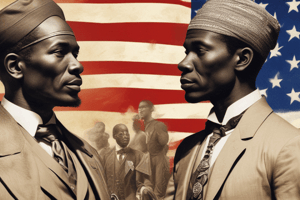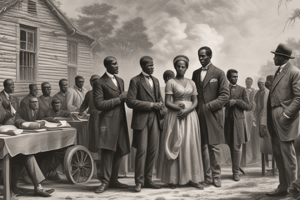Podcast
Questions and Answers
Who were the carpetbaggers and the scalawags?
Who were the carpetbaggers and the scalawags?
Carpetbaggers were Northerners who moved to the South, and scalawags were white Southerners who worked with Republicans and supported Reconstruction.
What political positions did formerly enslaved persons hold in the South?
What political positions did formerly enslaved persons hold in the South?
They worked as legislators, administrators, and delegates; held local offices and were elected to Congress.
What reforms did Republican governments institute?
What reforms did Republican governments institute?
They repealed the black codes, established state hospitals, rebuilt transportation systems and industries, and established a public education system.
How important were African American churches?
How important were African American churches?
Why were African American churches the center of their communities?
Why were African American churches the center of their communities?
How were schools established for African Americans?
How were schools established for African Americans?
Where was the Ku Klux Klan started?
Where was the Ku Klux Klan started?
How did the Ku Klux Klan intimidate African Americans?
How did the Ku Klux Klan intimidate African Americans?
How did the Republicans help African Americans reconstruct their lives as free persons?
How did the Republicans help African Americans reconstruct their lives as free persons?
Flashcards are hidden until you start studying
Study Notes
Carpetbaggers and Scalawags
- Carpetbaggers were Northerners who moved to the Southern states post-Civil War, often gaining political office.
- Scalawags were white Southerners who aligned with Republicans and supported reconstruction efforts.
Political Roles of Formerly Enslaved Persons
- Formerly enslaved individuals held various government positions, including legislators, administrators, and Congress members.
- They contributed to local governance and were elected at multiple levels.
Reforms by Republican Governments
- Republican administrations repealed discriminatory black codes.
- Significant infrastructure improvements included the rebuilding of transport systems and industries.
- A public education system was established, promoting access to education.
Importance of African American Churches
- Churches served as the sole controlled institutions for African Americans amid segregation.
- They played pivotal roles in leading political advocacy for civil rights.
Community Role of African American Churches
- Churches acted as venues for social and political gatherings, fostering community engagement.
- They also served unofficial judicial functions, providing a space for dispute resolutions.
Establishment of Schools for African Americans
- The Freedmen's Bureau was instrumental in founding 4,000 schools in the South post-war.
- Reconstruction governments created a robust public school system and founded universities like Howard and Tuskegee.
Origin of the Ku Klux Klan
- The Ku Klux Klan originated in Pulaski, Tennessee, aiming to expel carpetbaggers and intimidate African Americans.
Intimidation Tactics by the Ku Klux Klan
- KKK members disrupted Republican meetings, targeted Freedmen's Bureau officials, and resorted to arson against African American homes, schools, and churches.
- Their efforts included voter suppression tactics against African Americans and white Republicans.
Republican Support for African Americans' Reconstruction
- Many Northerners moved to the South to assist with rebuilding efforts during Reconstruction, some corrupted, while others genuinely aimed to help.
- Republicans facilitated African American participation in democracy through voting rights and government positions.
- The repeal of black codes and the establishment of elective offices were notable legislative achievements.
- Infrastructure improvements and confrontations with the KKK were significant, including the passage of three Enforcement Acts by Congressional Republicans to address violence.
Studying That Suits You
Use AI to generate personalized quizzes and flashcards to suit your learning preferences.




